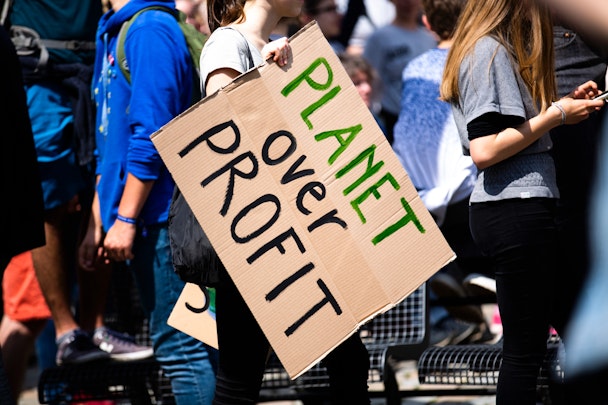Marketers paralyzed by ethical issues. At Interbrand that means big business
Brand leaders are increasingly likely to be fired for the handling of ethical issues rather than business performance. This Omnicom-owned agency wants to help them avoid that.

Consumers expect brands to have a say in political, societal and environmental issues / Pexels
To cater to growing fears from CMOs over missing the mark when it comes to wading in on political, social and environmental issues, Interbrand has expanded its brand consultancy offering to include ethics and integrity.
The launch of the agency’s new division came after it surveyed 80 brand leaders on the pressure they’re under to navigate ethical issues. It painted a worrying picture of how many feel ill-prepared to make the right call.
According to the results, as many as 85% of senior leaders reported having to address more complex ethical questions than they were three years ago. A further 80% said they have to make judgment calls where the right thing to do is unclear.
A second Interbrand study – this time polling 1,525 consumers in the USA, Germany, Brazil and India – found 90% of consumers are aware and concerned by sustainability or integrity issues, while 49% consider the ethics of a brand when making recommendations to others and 38% make purchase decisions based on the brand’s perceived ethics.
Advertisement
Statistics like these confirmed Interbrand’s need to set up a Brand Integrity & Ethics arm within its consultancy. Chief innovation officer Chris Nurko moved over to head up the new division at the Omnicom-owned agency earlier this year. He tells The Drum: “Today’s businesses can’t solely focus on the business itself. Neutrality across societal, political and economic crises is now seen as a failure of leadership.”
For the first time, brand bosses are being asked to make decisions on subjects that “sit far outside of their core areas of expertise,” Nurko says. “10 years ago, CEOs were fired for business performance issues; today, they are more likely to be fired for ethical issues,” he warns.
This has been the case for companies like NatWest, whose chief executive Dame Alison Rose was recently forced to exit after the decision to de-bank Nigel Farage over his political views. Or Ed Razek, the Victoria’s Secret CMO who left the brand after it hired its first openly transgender model. He had previously been criticized over his views that “transsexual” models should not be cast “because the show is a fantasy.”
But the recent Bud Light fiasco is arguably the biggest example of what happens when brand bosses make ethical decisions without consideration of the potential fallout. Its brand partnership with transgender creator Dylan Mulvaney sparked a backlash among the beer giant’s core Republican demographic. The two marketing leads who greenlit the activity (Alissa Heinerscheid, vice-president of marketing for Bud Light, and Daniel Blake, the marketing lead for its mainstream brands) were sacked but have since seen revenue in the US drop $395m – over 10% – compared with the same period a year prior. Its US and global CEOs have been criticized for how they handled the resulting PR fiasco, from both those who opposed its work with Mulvaney and the TikTok star’s supporters who said the brand abandoned her amid the backlash.
Advertisement
“It’s great if you have a purpose, and you have it written on your wall, and it’s nicely articulated,” he admits, “I’ve certainly done my share of those.” But a PR crisis like the Bud Light saga shows the risk to a brand if its organization and, crucially, senior leadership aren’t completely aligned with brand purpose activities.
To help brands achieve that, Interbrand’s new division is run in collaboration with the ethics advisor Principia Advisory. The offering aims to support brands and their senior leadership team to align brand purpose with the business structure and operations.
Consultants at Principia Advisory implant themselves within a brand to find ethical areas to improve on and assess the business for potential risks. Then draw up a framework for ethical decision-making and help embed it across the business.
“You have brands that are grounded in purpose like Ben and Jerry’s, but you have others that are coming to the realization, whether it’s on environmental or social issues, they need to turn up,” Nurko says. “You also have, particularly in the United States, the ‘woke versus broke’ argument that is emerging.”
Most agencies, like Interbrand, already work with marketers to strengthen a business’s purpose, both externally and internally, when it’s related to brand positioning. But Nukro says it will now work with the brand on elements like its systems, diagnostics, compliance and code of conduct.
Suggested newsletters for you
“You need to understand how companies incentivize reward and manage performance, which are codes of conduct and ethics. Those are just as important as the marketing and communications elements and when you connect them,” he says. “That is the next generation of purpose because it means that you’re aligning your values, your remuneration, your incentives, your rewards, your systems... you’re aligning that to what you say.”
Once the work has been completed, Interbrand will partner with fellow Omnicom agency Changing Our World, a social impact consultancy designed to help build a social strategy. It will then outsource the communications work to a creative agency. Mars has already rolled out a version of this, whereby its senior leaders are bonused against the delivery of its purpose and sustainability initiatives.
Nurko summarizes: “It’s no longer about just what you say, but how you build what you say into your culture, your organization, and how you manage and disclose that through ESG.”

